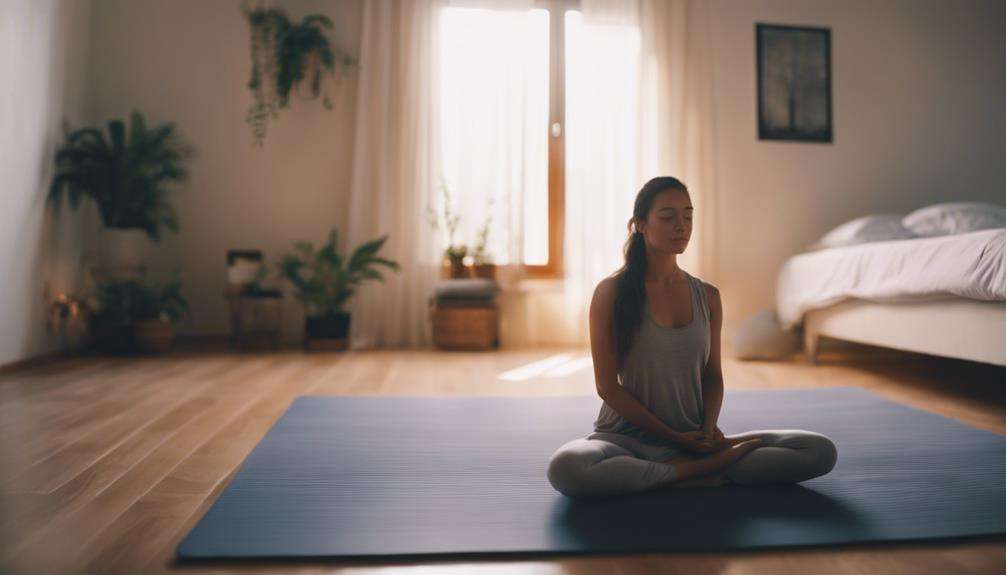When it comes to achieving deep, restorative sleep, mastering the art of Nidra meditation is key.
Discover how this ancient practice can unlock the door to a world of rejuvenating slumber, allowing you to tap into a realm of tranquility and inner peace.
Explore the transformative power of Nidra meditation as it guides you through a journey towards profound relaxation and enhanced sleep quality.
Unlock the secrets to a night of deep, uninterrupted rest by unraveling the mysteries of Nidra meditation's potential to revolutionize your sleep patterns.
Key Takeaways
- Yoga Nidra enhances sleep quality through deep relaxation and stress reduction.
- Guided meditation techniques prepare the mind and body for restful sleep.
- Consistent Nidra practice improves overall sleep patterns and promotes vitality.
- Mind-body connection fosters deep, rejuvenating sleep experiences for enhanced well-being.
Benefits of Yoga Nidra for Sleep Quality
If you struggle with getting restful sleep, incorporating Yoga Nidra into your routine can significantly enhance your sleep quality. Yoga Nidra, also known as yogic sleep, is a practice that promotes deep relaxation, helping to reduce stress and calm the nervous system.
By engaging in Yoga Nidra, you can experience a profound sense of relaxation that releases tension and quiets the mind, creating an optimal environment for restful sleep. This ancient practice works by shifting your brainwaves into a state similar to deep sleep, allowing for a more restorative rest experience.
The ability of Yoga Nidra to calm the nervous system and reduce stress and anxiety levels can greatly improve your overall sleep patterns and quality. By incorporating Yoga Nidra into your bedtime routine, you can pave the way for a more peaceful and rejuvenating night's sleep.
Understanding the Science Behind Yoga Nidra
You're about to uncover the fascinating science behind Yoga Nidra – a practice that activates your body's relaxation response, paving the way for deep restorative sleep.
Understanding how Yoga Nidra boosts GABA levels in your brain can help reduce anxiety and enhance your overall sense of calm.
Dive into the brainwave studies that reveal how this unique meditation technique induces a state of conscious deep sleep, offering you a path to healing and rejuvenation.
Brainwave Activity During Nidra
When delving into the realm of Yoga Nidra, understanding the brainwave activity that occurs during this practice provides valuable insights into its profound effects on relaxation and rejuvenation. The brainwave activity during Yoga Nidra shows a shift towards the theta state, associated with deep relaxation and creativity.
EEG studies reveal decreased beta waves and increased alpha waves during Yoga Nidra, indicating a state of calm alertness. Additionally, Yoga Nidra promotes the production of delta waves in the brain, linked to deep sleep and rejuvenation. By practicing Yoga Nidra regularly, you can train your brain to access the theta and delta brainwave states more efficiently.
- Embrace the calming theta state
- Explore the depths of deep relaxation
- Experience the tranquility of alpha waves
- Dive into the rejuvenating realm of delta waves
Benefits for Relaxation
To understand the science behind Yoga Nidra's benefits for relaxation, delve into how this practice effectively calms the nervous system and reduces stress levels. Yoga Nidra guides your mind and body into a profound state of relaxation, promoting deep restorative sleep. By incorporating this practice into your bedtime routine, you can release tension, quiet your mind, and prepare your body for a restful night's sleep.
Studies have shown that Yoga Nidra significantly improves sleep quality and overall well-being. This unique approach to deep relaxation is a game-changer for those looking to combat stress and anxiety, offering a pathway to a calmer mind and a rejuvenated body. Embrace the power of Yoga Nidra for a more peaceful and restorative sleep experience.
Steps to Practice Yoga Nidra for Better Sleep

To practice Yoga Nidra for better sleep, start by finding a quiet and comfortable space to lie down.
Begin by following guided meditation techniques that focus on relaxation and deep breathing.
These steps can help improve your sleep quality by calming your mind and body for a restful night.
Benefits of Yoga Nidra
Experience the transformative benefits of Yoga Nidra for achieving better sleep by immersing yourself in deep relaxation and guided meditation techniques. Yoga Nidra is a powerful practice that can help you improve your sleep quality and overall well-being. Here are some of the benefits you can expect:
- Promotes deep sleep: By shifting brainwaves into a restorative state.
- Reduces stress and anxiety: Helping you unwind and relax before bedtime.
- Calms the nervous system: Preparing your mind and body for restful sleep.
- Enhances relaxation: Through techniques like body scan, breath awareness, and visualization.
Yoga Nidra is particularly effective for those struggling with anxiety, racing thoughts, or restlessness at night. Embrace this practice to nurture a peaceful mind and a rejuvenated body.
Guided Meditation Techniques
Discover the calming power of Yoga Nidra through guided meditation techniques that can help you achieve a restful night's sleep. By engaging in practices such as body scans, breath awareness, and visualization, you can release tension and quiet your mind, paving the way for deep relaxation.
Yoga Nidra guides you through various stages of relaxation, preparing your body and mind for a night of deep sleep. This meditation method is specifically designed to calm the nervous system, promoting a state of relaxation that's conducive to falling asleep easily and enjoying a more restorative rest experience.
Embrace these techniques before bedtime to enhance your sleep quality, reduce anxiety, and facilitate a peaceful night's rest.
Improving Sleep Quality
For better sleep quality through Yoga Nidra, begin by creating a calm and comfortable space conducive to relaxation.
To enhance your sleep quality:
- Dim the lights to signal to your body that it's time to wind down.
- Use comfortable pillows and blankets for a cozy environment that promotes relaxation.
- Practice deep breathing exercises to quiet the mind and prepare for restful sleep.
- Follow guided Yoga Nidra meditations specifically tailored to improve sleep quality, focusing on releasing tension and calming the nervous system.
Yoga Nidra's deep relaxation techniques can help you achieve improved sleep by soothing your mind and body, paving the way for a rejuvenating night of rest.
Exploring Different Yoga Nidra Techniques

By exploring various Yoga Nidra techniques, you can deepen your relaxation practice and pave the way for profound restorative benefits. Yoga Nidra incorporates methods such as body scanning, breath awareness, and visualization to induce deep relaxation.
These techniques work wonders in releasing tension, calming the mind, and preparing your body for a restful sleep experience. As you engage in Yoga Nidra, you're guided through different stages of relaxation that ultimately lead you to a state akin to deep sleep.
This practice, when done before bedtime, can significantly enhance the quality of your sleep and promote a truly restorative rest. Yoga Nidra is particularly effective for individuals seeking to improve their deep sleep patterns, as it allows for complete relaxation of both the body and mind.
Embrace these techniques wholeheartedly to unlock the full potential of Yoga Nidra in enhancing your relaxation and facilitating a deep, rejuvenating sleep experience.
Enhancing Sleep With Yoga Nidra
If you're seeking ways to enhance your sleep quality, Yoga Nidra might just be the answer. Through relaxation techniques and a focus on the mind-body connection, this practice can help you achieve deep states of restorative rest.
Relaxation Through Nidra
Enhance your sleep quality and relaxation through the practice of Yoga Nidra, a guided meditation technique that promotes deep rest and calmness. Through Yoga Nidra, you can experience deep relaxation, reduce stress, and prepare your body and mind for a rejuvenating sleep. Here's how it can help you:
- Guided Meditation: By following the voice guiding you through the practice, you can let go of the day's worries and enter a state of peacefulness.
- Body Scans: The technique involves scanning your body for tension, allowing you to release it and relax deeply.
- Breath Awareness: Focusing on your breath helps calm the mind, making it easier to drift into a restful sleep.
- Visualizations: Engaging in calming visualizations can soothe your mind and create a peaceful mental space for sleep.
Improved Sleep Quality
To enhance your sleep quality effectively, consider incorporating Yoga Nidra meditation into your bedtime routine for a more restful and rejuvenating rest.
Yoga Nidra promotes deep sleep by calming the nervous system and guiding you through relaxation stages that prepare your mind and body for a peaceful night.
This practice is particularly beneficial for reducing stress and anxiety, making it ideal for those struggling with sleep issues related to these concerns.
By inducing a state of deep relaxation, Yoga Nidra can shift your brainwaves into a restorative sleep state, helping you experience more rejuvenating and fulfilling sleep cycles.
Including Yoga Nidra in your nightly routine can significantly enhance your sleep quality and overall well-being.
Mind-Body Connection
By harmonizing the connection between your mind and body, Yoga Nidra facilitates deep and rejuvenating sleep experiences. Yoga Nidra enhances the mind-body connection to promote deep sleep through a combination of relaxation techniques and mindfulness. This practice helps in calming your mind and relaxing your body, setting the stage for a restful night's sleep. By incorporating Yoga Nidra into your bedtime routine, you can improve your sleep quality and enhance your sleep-wake cycle. The deep relaxation induced by Yoga Nidra paves the way for a more profound and rejuvenating sleep, allowing you to wake up feeling refreshed and revitalized.
- Experience the tranquility of a calm mind and relaxed body.
- Embrace the deep rest that Yoga Nidra brings to your sleep.
- Enhance your sleep quality through mindful relaxation techniques.
- Rejuvenate your body and mind for a revitalized morning.
Deepening Relaxation Through Nidra Meditation
Indulge in deeper relaxation through Nidra meditation, a practice that guides you into a state of profound rest akin to deep sleep. Nidra meditation, also known as Yoga Nidra, is a powerful technique that helps you achieve deep relaxation by systematically releasing tension from your body and quieting your mind. By following the soothing voice guiding you through this practice, you can experience a sense of peace and tranquility, enhancing the quality of your relaxation and promoting better sleep. This meditative process allows for a deepening of relaxation that goes beyond what regular sleep can offer, leading to profound rest and rejuvenation.
Regular practice of Nidra meditation can significantly improve your overall well-being by reducing stress, increasing mental clarity, and creating a profound sense of calm. Through this deep relaxation technique, you can tap into the body's natural ability to heal and restore itself, ultimately supporting your journey towards deep, restorative sleep and enhanced vitality.
The Role of Breathing in Yoga Nidra Practice

Incorporate deep, conscious breathing into your Yoga Nidra practice to promote relaxation and calm your nervous system effectively. When focusing on your breath during Yoga Nidra, you're aiding in quieting your mind and reducing stress. Mindful breathing techniques in Yoga Nidra support the transition into a restful state for better sleep. Controlled breathing patterns not only enhance the effectiveness of your meditation practice but also deepen your connection to the present moment. Dive into the profound benefits of deep breathing in your Yoga Nidra sessions and experience the transformative power it holds for your overall well-being.
Embrace the following benefits of incorporating deep breathing into your Yoga Nidra practice:
- Enhanced relaxation and stress reduction
- Improved mental clarity and focus
- Better sleep quality and restfulness
- Heightened awareness and mindfulness throughout the day
Establishing a Consistent Nidra Meditation Routine
Wondering how to establish a consistent Nidra meditation routine for optimal deep sleep benefits? Consistency is crucial when aiming to achieve a deep state of relaxation through Nidra meditation. Start by designating a specific time each day for your practice. This helps in creating a habit and ensures you prioritize this essential aspect of your sleep wellness plan. Following a structured routine not only enhances the benefits of practicing Yoga Nidra but also improves sleep quality over time.
Integrating Nidra meditation into your daily schedule can significantly impact your ability to relax and unwind before bedtime, fostering a peaceful environment that promotes better sleep outcomes. By committing to regular Nidra meditation sessions, you pave the way for a more restful and rejuvenating night's sleep. Remember, the key lies in dedicating yourself to the practice and making it a non-negotiable part of your daily routine to reap the full benefits of this deeply relaxing form of meditation.
Integrating Yoga Nidra Into Your Sleep Wellness Plan

To enhance the quality of your sleep and promote deep relaxation, consider integrating Yoga Nidra into your personalized sleep wellness plan. By incorporating this practice, you can effectively calm your nervous system and enhance deep sleep by shifting brainwaves into a state conducive to restorative rest.
Here are some ways Yoga Nidra can benefit your sleep:
- Deep Relaxation: Experience profound relaxation of both your body and mind.
- Calming the Nervous System: Reduce stress and anxiety levels, allowing for a more peaceful sleep.
- Enhancing Deep Sleep: Improve the quality of your rest by guiding your mind and body into a state similar to deep sleep.
- Restorative Rest: Facilitate rejuvenation and recovery during your sleep cycle.
Integrating Yoga Nidra into your bedtime routine can lead to a transformative sleep experience, where you wake up feeling refreshed and rejuvenated. Embrace this practice to unlock the full potential of deep relaxation and enhance your overall sleep wellness.
Personal Experiences With Yoga Nidra for Sleep
Considering the benefits experienced by individuals who've practiced Yoga Nidra for sleep, it becomes evident that personal experiences with this technique often lead to significant improvements in sleep quality and overall well-being.
People who engage in Yoga Nidra sessions frequently report feeling more relaxed, calm, and refreshed after each practice. The deep relaxation induced by Yoga Nidra helps many individuals fall asleep faster and enjoy a more restful night's sleep. By incorporating Yoga Nidra into their bedtime routine, many have noticed a reduction in insomnia symptoms and fewer disturbances during the night.
Waking up feeling more energized and rejuvenated is a common experience among those who regularly practice Yoga Nidra. The personal experiences shared by users highlight the effectiveness of Yoga Nidra in promoting improved sleep patterns and enhancing overall wellness.
If you're looking to enhance your sleep quality and experience deep relaxation, incorporating Yoga Nidra into your routine could be a valuable addition.
Frequently Asked Questions
Does Yoga Nidra Increase Deep Sleep?
Yes, Yoga Nidra increases deep sleep by promoting relaxation and reducing stress. The guided practice calms your mind and body, facilitating the transition into deep sleep stages. Experience the benefits of meditation for improved sleep and mind-body connection.
What Is the Correct Sequence for Yoga Nidra?
To experience Yoga Nidra correctly, lie comfortably in Corpse Pose. Engage in a body scan, breath awareness, and visualization techniques. Relax each body part sequentially with deep breaths. Bring awareness to your entire body before rising slowly.
How Many Hours of Sleep Is an Hour of Yoga Nidra Equal To?
An hour of Yoga Nidra equals 3-4 hours of regular sleep, enhancing sleep quality. It influences brain waves for deep rest, offering meditation benefits. Embrace this practice for rejuvenation, mental clarity, and physical relaxation in a condensed timeframe.
What Happens if You Sleep During Yoga Nidra?
If you snooze during Yoga Nidra, you risk missing out on its full effects like heightened awareness. While it signals a need for rest, staying consciously aware allows for deep rejuvenation and healing benefits.
Conclusion
As you drift off into a peaceful slumber, imagine yourself being gently cradled by the soothing waves of Yoga Nidra. Feel the tension melting away, leaving you in a state of deep relaxation.
Embrace the stillness of the night and let the practice guide you to a restful sleep. With Yoga Nidra by your side, you can unlock the secrets to a rejuvenating rest and wake up feeling refreshed and ready to conquer the day ahead.
Sweet dreams await you.






